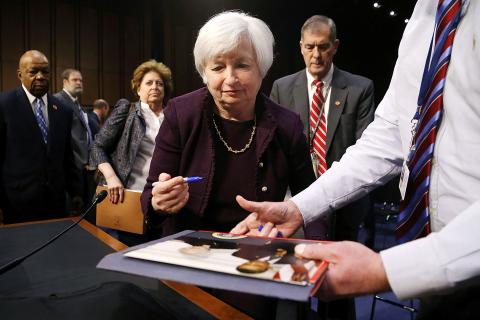US Federal Reserve Chair Janet Yellen said on Wednesday that the US economy is improving, but added that the job market remains “far from satisfactory” and inflation is still below the US central bank’s target rate.
Speaking to the US Congress’ Joint Economic Committee, Yellen said that as a result, she expects low borrowing rates will continue to be needed for a “considerable time.”
Yellen’s comments echo earlier signals that the Fed has no intention of acting soon to raise its key target for short-term interest rates even though the job market has strengthened and economic growth is poised to rebound this year. The Fed has kept short-term rates at a record low near zero since December 2008.

Photo: Reuters
Asian stock markets were mostly higher yesterday after China’s trade improved and Yellen vowed low interest rates would continue until the US job market is healthy. Tokyo’s Nikkei 225 stock index, the region’s heavyweight, advanced 0.9 percent to 14,163.78, and South Korea’s KOSPI added 0.6 percent to 1,950.60, while Hong Kong’s Hang Seng rose 0.3 percent to 21,818.38 and China’s Shanghai Composite gained 0.2 percent to 2,013.98.
At the committee, Yellen cautioned that geopolitical tensions, a renewal of financial stress in emerging markets and a faltering housing recovery pose potential threats.
In response to a question, Yellen described rising income disparities in the US as a “very worrisome trend” that could undercut economic stability and democratic principles. However, she cautioned that “it’s hard to get clear evidence” that pay or wealth disparities have slowed economic growth.
US Senator Roger Wicker argued that the Fed’s own policies had helped widen the wealth gap in the US. The Fed-engineered low rates, intended to fuel the economy, have boosted stock prices and wealth for the richest Americans, Wicker said.
Yellen countered that low rates had strengthened overall economic growth and helped home prices recover from the housing bust, thereby helping ordinary households.
US Representative Kevin Brady, the committee chairman, pressed Yellen to specify when the Fed might start raising short-term rates and how it would act to pare its record holdings of Treasury and mortgage bonds.
Yellen said she could not give a date, but added that the Fed expects to begin raising rates when it sees enough progress in restoring full employment and when inflation has returned to its target of 2 percent.
She pointed to the Fed’s latest quarterly economic forecasts, which showed that most members expect the Fed to begin raising short-term rates next year or 2016.
Yellen added that even when the Fed’s bond purchases end, it intends to maintain its high level of holdings and will begin to reduce them only when the economy can withstand the pullback. The Fed’s record investment portfolio exceeds US$4 trillion.
However, Yellen said the Fed wants to avoid past mistakes of keeping its policies loose for too long and thereby fueling inflation. She cited the prolonged bout of high inflation of the 1970s.
“The lessons of that period are very real to all of us, and none of us want to make that mistake again,” Yellen said.

Taiwan’s exports soared 56 percent year-on-year to an all-time high of US$64.05 billion last month, propelled by surging global demand for artificial intelligence (AI), high-performance computing and cloud service infrastructure, the Ministry of Finance said yesterday. Department of Statistics Director-General Beatrice Tsai (蔡美娜) called the figure an unexpected upside surprise, citing a wave of technology orders from overseas customers alongside the usual year-end shopping season for technology products. Growth is likely to remain strong this month, she said, projecting a 40 percent to 45 percent expansion on an annual basis. The outperformance could prompt the Directorate-General of Budget, Accounting and

Two Chinese chipmakers are attracting strong retail investor demand, buoyed by industry peer Moore Threads Technology Co’s (摩爾線程) stellar debut. The retail portion of MetaX Integrated Circuits (Shanghai) Co’s (上海沐曦) upcoming initial public offering (IPO) was 2,986 times oversubscribed on Friday, according to a filing. Meanwhile, Beijing Onmicro Electronics Co (北京昂瑞微), which makes radio frequency chips, was 2,899 times oversubscribed on Friday, its filing showed. The bids coincided with Moore Threads’ trading debut, which surged 425 percent on Friday after raising 8 billion yuan (US$1.13 billion) on bets that the company could emerge as a viable local competitor to Nvidia

BARRIERS: Gudeng’s chairman said it was unlikely that the US could replicate Taiwan’s science parks in Arizona, given its strict immigration policies and cultural differences Gudeng Precision Industrial Co (家登), which supplies wafer pods to the world’s major semiconductor firms, yesterday said it is in no rush to set up production in the US due to high costs. The company supplies its customers through a warehouse in Arizona jointly operated by TSS Holdings Ltd (德鑫控股), a joint holding of Gudeng and 17 Taiwanese firms in the semiconductor supply chain, including specialty plastic compounds producer Nytex Composites Co (耐特) and automated material handling system supplier Symtek Automation Asia Co (迅得). While the company has long been exploring the feasibility of setting up production in the US to address

OPTION: Uber said it could provide higher pay for batch trips, if incentives for batching is not removed entirely, as the latter would force it to pass on the costs to consumers Uber Technologies Inc yesterday warned that proposed restrictions on batching orders and minimum wages could prompt a NT$20 delivery fee increase in Taiwan, as lower efficiency would drive up costs. Uber CEO Dara Khosrowshahi made the remarks yesterday during his visit to Taiwan. He is on a multileg trip to the region, which includes stops in South Korea and Japan. His visit coincided the release last month of the Ministry of Labor’s draft bill on the delivery sector, which aims to safeguard delivery workers’ rights and improve their welfare. The ministry set the minimum pay for local food delivery drivers at